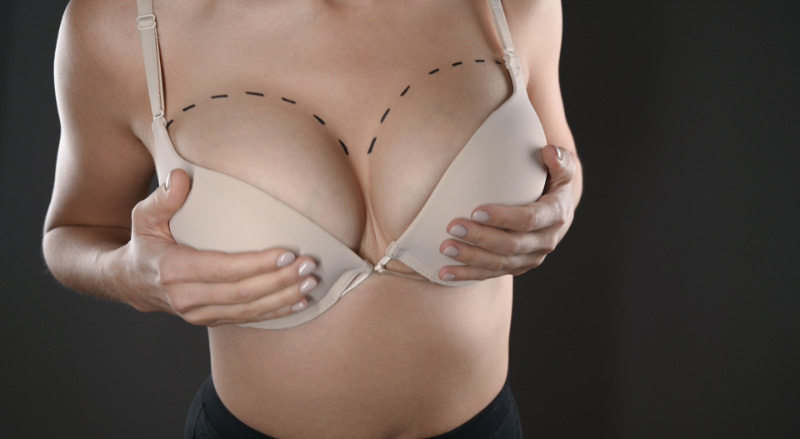
Have you been considering breast augmentation in Dallas? The decision to have a breast augmentation is a personal one, and you should weigh the benefits and risks of this medical procedure.
Some of the risks of include:
- Anesthesia problems
- Breast Implant Removal
- Excessive bleeding
- Breast implants associated anaplastic large cell lymphoma (BIA-ALCL)
- Changes in nipples and/or breast sensation
- Accumulation of fluid in the breast tissue
- Tight scar tissue forming around the breast implant (capsular contracture)
- Hematoma
- Pain that does not subside over time
- Breast Implant Revision surgery
- Skin wrinkling over the breast implant
- Improper implant position
- Breast reconstruction
This guide provides essential information about breast augmentation and its risks, who the best candidates are, and the consultation process.
More Information About Breast Augmentation Risks
Breast implant surgery approved by FDA undergo years of testing to demonstrate breast implants are reasonably safe and effective. Most patients who have surgery experience no significant complications.
However, there are risks to having breast augmentation. One of the most serious is breast implant-associated anaplastic large cell lymphoma (BIA-ALCL). Another is breast implant illness (BII) that some patients say are caused by their breast implants. Some of the symptoms of BII (breast implant illness) include:
- Fatigue
- ‘Brain fog’
- Joint and muscle pain
- Rash
If any breast augmentation complications appears after breast augmentation surgery, it is vital to immediately talk to your plastic surgeon. If you want to have your breast implants removed, be sure to discuss it with your surgeon.
Other considerations:
- Breast augmentation is not guaranteed to last your entire life. You could need surgery to replace one or both breast implants in the future.
- Weight loss, menopause, and pregnancy can affect how your breast implants appear over time.
- Breast implants do not prevent breasts from sagging. You could require a breast lift in addition to implants.
- Mammograms can be more difficult.
- Checking for silicone implant rupture is advised. FDA recommends checking the condition of silicone breast implants with a breast MRI every six years to check if they have ruptured. After that, you should have a breast MRI every 24-36 months.
- Breast Implants can complicate breastfeeding. Some women can breastfeed after surgery. Others find it difficult.
- Breast Implants requires periodic examinations of the breasts’ health and evaluates the implants’ overall condition.
If you notice any changes to your breast implants or breasts after the surgery that concern you, talk to your plastic surgeon.
Who Is a Candidate For Breast Augmentation?
Once you understand the risks of breast augmentation, there are several criteria that make a plastic surgeon consider you a good candidate:
- You should be in good health. This means you do not have active infections, untreated cancer, or serious illnesses. If you have medical problems, it is vital to talk about them with your plastic surgeon to help you determine if the surgery is right for you.
- If you have flattened, sagging, or elongated breasts, you could be a good candidate for textured breast implants.
- Most plastic surgeons prefer that you are not a smoker or heavy drinker.
- They can permanently change your appearance, so it is vital to be in good mental health when choosing this procedure.
- They will change your appearance to some degree, but it will not solve body image problems or make you look entirely different. Have realistic expectations about the surgery.
- You should be able to rest and recover after your breast augmentation. You will be unable to do some tasks or heavy lifting for several weeks, so you should have people available to help you as needed.
Your Consultation
Your surgeon will talk to you about this procedure’s risks and benefits during your consultation. He also will ask you about:
- Why you want the procedure, and what your expectations are
- Medical issues, drug allergies, and previous medical treatments
- Medications you are taking as well as herbal supplements and vitamins
- Your family history of breast cancer
What To Expect During the Procedure
Breast augmentation is usually performed under general anesthesia. During the procedure, your surgeon will cut in one of these places:
- Crease under the breast
- Under the arm
- Around the nipple
After making the incision, your plastic surgeon will separate the breast tissue from the chest’s muscles and other tissue. This creates a pocket behind or in front of your chest wall’s outer muscle. Your surgeon places the implant in the pocket and centers it behind the nipple.
Saline breast implants are put in the chest wall empty and filled with solution when they are in place. Silicone implants contain silicone gel when they are inserted.
After the implants are in place, your surgeon will close the breast augmentation incisions and bandage them with surgical tape and skin adhesive.
You will probably have swelling and soreness for several weeks after breast augmentation. Scars will fade over time, but they will not disappear and you might have scar tissue.
If you notice redness or warmth under your breast or have a fever, your implants could be infected. Talk to your plastic surgeon as soon as you can.
 Questions and Answers
Questions and Answers
What is capsular contracture?
Capsular contracture occurs as the immune system reacts to foreign substances within the body.
Are Breast Implants a high risk surgery?
Nonetheless, breast implants carry certain risks, such as breast implant-associated anaplastic large cell lymphoma (BIA-ALCL), breast implant-associated squamous cell carcinoma (BIA-SCC), and systemic symptoms often linked to breast implant illness (BII), which some patients connect to their implants.
What is the most common complication of breast augmentation surgery?
The primary complications include reoperation, capsular contracture, implant removal, and breast implant rupture. After your breast surgery, it’s crucial to schedule routine follow-up exams and adhere to your physician’s guidance for monitoring your breast implants.
Request a Consultation
If you’re dreaming about a more attractive chest and want breast implants, it’s a good move to talk to your plastic surgeon about this cosmetic procedure’s risks and benefits. Please schedule a an appointment with board certified plastic surgeon Dr. Raja Mohan today.
References
- Safety. (n.d.). Retrieved from https://www.plasticsurgery.org/cosmetic-procedures/breast-augmentation/safety
- Risks and Complications of Breast Implants. (September 2020). Retrieved from https://www.fda.gov/medical-devices/breast-implants/risks-and-complications-breast-implants
- Overview. (n.d.). Retrieved from https://www.mayoclinic.org/tests-procedures/breast-augmentation/about/pac-20393178